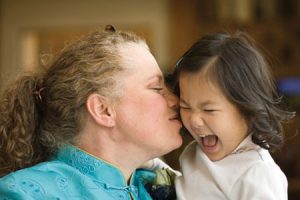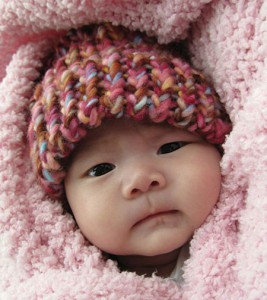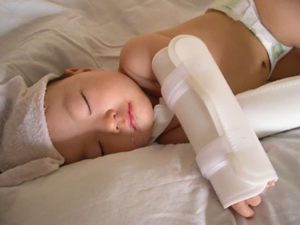Inspired by a parable, an alumna has rescued more than 100 Chinese orphans.

In 2005 Amanda de Lange took charge of six Chinese infants in need of medical attention and helped prepare them for adoption. Four years later, when she received BYU’s Service to Family Award, one of those six was there to thank her.
As Amanda de Lange (BS ’96) walked through the government-run Chinese orphanage, her goal was to find a physically disabled baby who desperately needed her help. Many of the children at the orphanage had been deposited at hospital entrances, dumped off at cemeteries, or simply discarded by the sides of roads—thrown away. Knowing this spurred de Lange onward, looking for the child who needed her most.
On that day she found Sean, an infant with a heart condition who was little more than bone with skin. “He seemed so alone and looked horrible; I knew he was mine,” she says.
Under de Lange’s care, Sean’s health improved rapidly. Within five months he was a beautiful roly-poly baby who eventually became the adopted son of a couple in France.
As part of her work as founder and CEO of Starfish Children’s Services in Xi’an, China, de Lange provides care for orphans who have heart defects, cleft palates, and spina bifida. She takes her inspiration from the tale about a boy tossing washed-up starfish back into the ocean to save them from the burning sun. When told he could not possibly make a difference because there were miles and miles of beaches littered with starfish he could not save, the boy merely tossed another starfish into the ocean and said, “For this one, it makes a difference.”
Following her creed—“I will make a difference to this baby”—de Lange has made a difference to more than 100 babies since the Chinese government gave her permission to operate a foster home nearly five years ago.
De Lange had been working in Taiwan and saving money to attend graduate school in the United States when she accepted a teaching position in China. There she met a liaison for an orphanage that facilitated international adoptions. De Lange offered to volunteer and arranged visits for the next six months. During that time she secured a lucrative te
aching position in Korea to help her with her master’s degree, but within a week of her scheduled acceptance, she made a life-changing decision.
“I only had a few days to accept the job, but when I returned to the government orphanage, I became upset on behalf of a dying baby no one was helping. I felt terrible,” she says. When someone casually suggested she write a proposal to start her own care center, she decided to forego moving to Korea and instead find a way to help the orphans.
“I’m a Westerner,” says the South Africa native. “What were the odds that a foreigner would be given permission to start anything like this in China? I thought it was impossible.” She was shocked when the orphanage and government accepted her petition just four days after submitting her proposal. By September 2005 she had opened Starfish, been given access to unlimited babies, and had a multi-year contract in hand.
 “Where were the piles of paperwork, the months of waiting, and the endless visits to the government?” she wrote in a blog a few months later. “What happened to that slow grind of bureaucracy? The speed at which this took place scared me, and it took a few months to come to terms with what it all meant. A few months earlier I had asked to become a foster parent and was turned down flat. Now I was offered as many as I could handle.”
“Where were the piles of paperwork, the months of waiting, and the endless visits to the government?” she wrote in a blog a few months later. “What happened to that slow grind of bureaucracy? The speed at which this took place scared me, and it took a few months to come to terms with what it all meant. A few months earlier I had asked to become a foster parent and was turned down flat. Now I was offered as many as I could handle.”
One morning the orphanage delivered five girls and a boy to Starfish, which doubles as de Lange’s home. Three of the girls were malnourished and not expected to live, but under de Lange’s nurturing, they thrived, received needed surgeries, and were later adopted by families in the United States.
Little prepared de Lange for the job beyond her passion to save these children, her savings, and the basic Mandarin she learned in Taiwan. “My learning curve was enormous,” she says. “I was not medically or financially trained, and I didn’t know where to go and what to do in a foreign country. I was the only one there taking care of six babies, allunder four months. I spent countless hours feeding, changing diapers, and doing laundry.”
Hers is a round-the-clock schedule of care. There are times when babies with severe cleft palates have a hard time swallowing, and de Lange uses an eyedropper to feed them one drop at a time. “It still takes a mountain of tenacity and hard work,” she says.
Fortunately, along the way she’s garnered help. “As I hunted for more resources, I eventually found medical teams who came to China,” she says. “I uncovered medical angels and dedicated donors. Knowing what I know now, I would have gotten nannies much sooner. I now have a solid structure in place that includes a foundation, paid nannies, volunteers, and fund-raisers.”
Her work in Xi’an is growing as her reputation is spreading. In just a month de Lange arranged for five medical teams to visit the local hospital before the end of 2010. “I would love to host doctors with a different specialty each month,” says de Lange, her biggest need being neurosurgeons. “There is so much service that can be done.”
An avid fund-raiser, de Lange credits BYU for teaching her how to write well: “Good, clear writing makes a big difference when I’m seeking funds,” she says.
When she raised money in Nashville, Tenn., last summer, seven of the families who adopted children she cared for drove out to see her. “I love seeing the results of what we do,” she says. “Although it can be a bit painful when they are adopted, seeing their lives afterward is fabulous. I am so grateful that I was here when the babies needed help the most.”
The oldest of the original six babies she took into her care was four-month-old Flower. A Boise, Idaho, family eventually adopted Flower and brought her to BYU when de Lange received the university’s Service to Family Award in 2009. Flower squealed and ran into the arms of her beloved “Mama,” insisting that she accompany her to the award podium. Lively and outgoing, Flower shows little evidence of having received corrective surgery for spina bifida.
“She may never be a wonderful athlete, but she can have a wonderful life,” de Lange says. “It was a little bittersweet to lose her, but I’m clear about my role. I’m a provider, defender, protector, and record keeper as I help prepare my babies for loving adoptive homes.”
D e Lange is particularly proud of a baby from her first group who was missing fingers and had two toes in front and one in the back. “I was told she would never be able to hold anything, but she became very good at picking up the pencil grip. I also was told she would never walk, but at 10-and-a-half months, she became the youngest baby to walk at Starfish.”
e Lange is particularly proud of a baby from her first group who was missing fingers and had two toes in front and one in the back. “I was told she would never be able to hold anything, but she became very good at picking up the pencil grip. I also was told she would never walk, but at 10-and-a-half months, she became the youngest baby to walk at Starfish.”
De Lange’s rewards will likely never be monetary. She used her own savings to get started; after three years, she asked foundation administrators if she could take out some funds to live, which amounted to about a quarter of the money she made as a student laundry worker at BYU. While she lives on almost nothing, she says her compensation is great. “Looking back, I can see the hand of the Lord very clearly guiding me,” she says. “So while I may never get a master’s degree, my detour in China has forever changed my life and the lives of dozens of disabled and abandoned Chinese babies and toddlers.”
Visit the Starfish Web site at thestarfishfosterhome.org.






